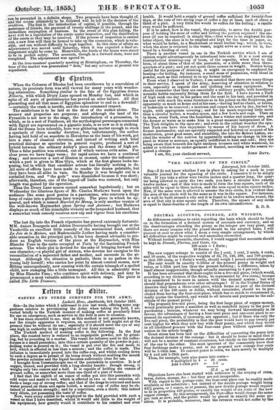ittttro to tilt Calor.
COFFEE AND OTHER COMFORTS FOR THE ARMY.
Lesketh How, ilmbkside, 8th October 1855.
Sin—In the letter which I addressed to you last week, offering some sug- gestions relative to provisioning the Army when taking the field, I ad- verted briefly to the Turkish manner of making coffee as peculiarly fitted for use on emergency, such as service in the field is sure to occasion. It has since occurred to me, that as this method is not generally known, nor the simple apparatus it requires, an account of both might not at the present time be without its use ; especially if it should meet the eye of any one high in authority in the regulation of our Army economy. The Turkish method of making coffee is the following. In the first place, the roasted berry is reduced to an impalpable powder, not by grind- ing, but by pounding in a mortar. The vessel for infusion used in the coffee- houses is a small pannakin ; into this a certain quantity of the powder is put; boiling water is poured on it ; the vessel is put over the fire and made to boil, which is effected in less than a minute ; and the coffee is made. The infusion is immediately poured into the coffee-cup, and whilst cooling down to such a degree as to permit of its being drunk without scalding the mouth the powder subsides and the liquid becomes sufficiently clear for use. I brought from Constantinople one of the pannakins in question. It is of copper, tinned, and provided with a long slender handle: though strong, it weighs only two ounces and a half. It is capable of holding six ounces of ground coffee, or somewhat more than one-third of a pint of water.
I find that the eighth of an ounce of coffee put into this pannakin with cold water and made to boil, which is effected in two or three minutes, af- fords a large cup of strong coffee; and that if the dregs be returned and more water poured on them and again boiled, a second cup of coffee may be ob- tained of moderate strength ; and by a repetition, even a third; this indeed very dilute, yet possessing the taste of coffee.
Now, were every soldier to be employed in the field provided with such a weasel as that I have described, whilst it would add little to the weight of his equipment, how greatly would it contribute to his comfort and even
health. It would hold a supply of ground coffee sufficient for twenty--four days, at the rate of two strong cups of coffee a day at least, each of about a third of a pint. A very little fire would be suffice for the boiling ; a candle even would be sufficient.
If it be asked, how is the vessel, the pannakin, to serve the double pur- pose of holding the store of coffee and boiling the portion required ? the an- swer (if one be required) is simply this,—that when to be employed for the latter object, the store is to be emptied and kept for the time in paper, or what would be better, in a Mackintosh or small leather bag ; which, in turn, when the store is returned to the vessel, might serve as a cover for it, fas- tened by a binding of cord.
There is another vessel in use in the Turkish service which I am of opinion might advantageously be introduced into ours. It is a neat strong hemispherical drinking-cup of braes, of the capacity, when filled to the brim, of about three of that of the pent akin, or a little more than three- quarters of a pint ; and yet not quite three ounces in weight. Besides being useful for the purpose of drinking, it might on emergency be employed for heating—for boiling, for instance, a small mess of pemmican, with bread in powder, such as that referred to in my former letter.
From what I observed in Turkey, I am satisfied that there are many things in their service, I speak of the army, deserving of attention in relation to ours, especially as regards diet and clothing and camp equipment. We should remember that they are essentially a military people, with hereditary nomadic habits eminently titling them for the field. I have known a Turk of high rank one day in his palace and the next in his tent, and provided in his tent with much the same furniture as in his palace on the Bosphorus, and apparently as much at home and at his ease,—having had no chairs, or tables, or bedsteads to be removed ; a mattress and carpet his seat by day, his bed by night, with appropriate covering ; and for his meals requiring little more than a circular waiter, a wooden spoon, and a few bowls and cups. Then as to dress, every Turk, even the humblest, has a winter and summer one, and the former so warm as to make him iu a great measure independent of fire. The Turk delights in the open air ; and even in the coldest weather the opu- lent Turk can have this enjoyment by means of his luxury of dress. A former Ambassador, and one specially respected and beloved on account of his moderation, great good sense, and amiability, the late Sir Robert Liston, ex- cited the wonder of the natives by apparently making no change in his ap- parel in winter or summer, as equally indifferent to heat and cold; they not being aware that beneath his light nankeen trousers and white waistcoat, he added or withdrew an under-garment of flannel, according as the season re- quired a change.


























 Previous page
Previous page